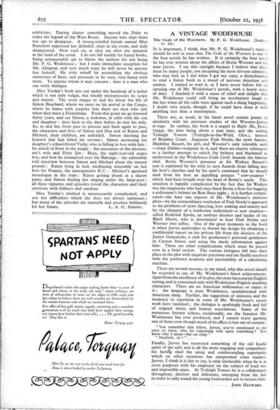A VINTAGE WODEHOUSE
7s. 6d.) _ _ . . .
IT is important, I think, that Mr. P. G. Wodehouse's reade: should be told at once that The Code of the Woosters is one of the best novels he has written. It is certainly the best novel he has ever written about the affairs of Bertie Wooster and his man Jeeves. I say this..outrijilit .because I believe that there must be many people, not _excepting his most fervent admirers, who may feel, as I did when I got my copy, a disinclination to read a funny book in a mood of nervous dejection and anxiety. I started to read it, as I have never before felt on opening one of Mr. WodehoUse's novels, with a heavy sense of duty. I finished it with a sense of relief and delight that Mr. Wodehouse could still bring an involuntary laugh to the lips when all the odds were against such a thing happening. I doubt very much, though; if lie' could have done it with anything less than a masterpiece.
There are, as usual, in his latest novel certain points of similarity with his previous studies of the Wooster-Jeeves rn."nage. In outline, the book is a sequel to Right Ho, Jeeves
(1934), the time being about a year later, and the setting Totleigh Towers (Totleigh-in-the-Wold, Glos.), instead of Brinkley Court. Augustus Fink Nottle, the newt fancier, Madeline Bassett, his girl, and Wooster's only tolerable aunt —Aunt Dahlia—reappear in it, and there are elusive references to a further attempt to snitch (by bribery and blackmail as understood in the Wodehouse , Code Civil) Anatole the famous chef. Bertie Wooster's presence at Sir Watkyn Bassett's seat is explained by his wish to save Anatole from falling into his host's clutches and by his aunt's command that he should steal from his host an appalling antique " cow-creamer " which had been bought over the head of Bertie's uncle. This situation is happily complicated by the fact that Sir Watkyn was the magistrate who had once fined Bertie a fiver for bagging a policeman's helmet on Boat Race night ; it is further compli- cated—the least one expects of Mr. Wodehouse's intricate plots—by the extraordinary confusion of Fink Nottle's approach to the problems of newt fancying, love making and oratory and by the ubiquity of a loathsome individual—a new creation— called Roderick Spode, an embryo dictator and leader of the Black Shorts, who is determined to beat Fink Nottle and Wooster into jellies. One of the great moments in the book is when Jeeves undertakes to thwart his design by obtaining a confidential report on his private life from the dossiers of the Junior Ganymede, a club for gentlemen's personal gentlemen in Curzon Street, and using the shady information against him. There are other complications which must be passed over in a brief review. The various intrigues fall into their place in the plot with exquisite precision and are finally resolved• with the perfected economy and inevitability of a calculating machine.
There are several reasons, to my mind, why this novel should be regarded as one of Mr. Wodehouse's finest achievements. Apart from the excellence of its plot, the story has a purely English setting, and is concerned only with Wodehouse-English speaking characters. There are no American millionaires or aides in it ; the language is pure Wodehouse, unadulterated with American slang. Further, the suggestion of staleness and the tendency to repetition in some of Mr. Wodehouse's recent work have vanished ; the dialogue is sparkingly freih and full of original twists and bizarre associations. Some of the numerous literary echoes, incidentally, are the funniest Mr. Wodehouse has ever produced, and I cannot resist quoting one of them even though much of its effect is lost out of context : " You remember that fellow, Jeeves, you've mentioned to me once or twice, who let something wait upon something ? You know who I mean—the cat chap."
" Macbeth, sir ? " . . .
Finally, Jeeves has recovered something of the old feudal spirit of the serf, and is all the more engaging and sympathetic for haviitg shed the smug and condescending superiority which on other occasions has exasperated some readers. Jeeves, I think it is fair to say, is only intolerable when he is at cross purposes with his employer on the subject of loud ties and impossible spats. At Totleigh Towers he is a collaborator throughout, discreet and deterrent, emerging from his lair in order to rally round the young boulvardier not to leCture him.















































 Previous page
Previous page